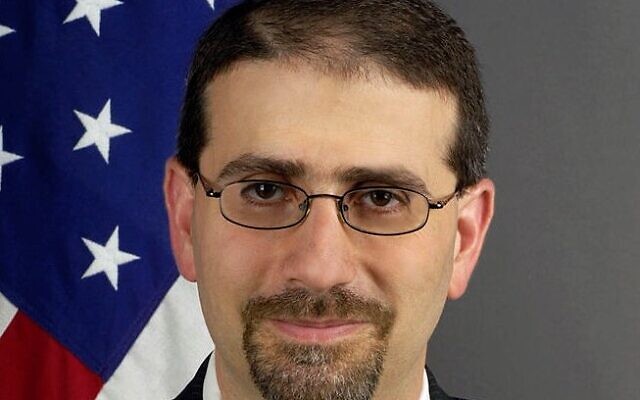Webinars Proliferate as Israelis Protest Weekly
High-tech community takes aim at government’s legislation.

Day by day, Israeli news media report another international credit rating company warning that it could lower the country’s credit outlook, another Israeli high-tech company is moving its money and, sometimes, employees abroad, individual Israelis are seeking citizenship elsewhere, and more sectors of society are protesting in the streets and in letters to their leaders. That includes some pilots and reserve soldiers who are threatening to ignore military call-up.
In a snowball effect, leaders in Israel and in the Jewish community are using the word “crisis” repeatedly and on several levels: security, diplomacy, economic, societal and on Israel’s overall future as a democratic state. All of this is in response to proposed weakening of the country’s independent judicial system.
Israel doesn’t have a constitution that would protect the rights of citizens.
As the pace of the Israeli coalition government’s controversial legislative blitz quickens and expands, so do the number and diversity of the protests in Israel and abroad, as well as the quantity and depth of the webinars sponsored by various newspapers, universities and organizations. Everyone, it seems, is trying to understand the Israeli government’s legislative agenda and are worried about its trickle-down effects.

Referring to the societal and economic impact of the coalition government’s proposed judicial overhaul, one Atlanta Jewish leader bluntly said, “This is going downhill fast.”
The latest high-tech announcement, at least at this newspaper’s deadline, was made by Israeli tech unicorn Riskified, which declared that it would transfer $500 million out of Israel and offered to relocate some staff to Portugal. [A unicorn is a privately held company valued at more than $1 billion. Israel is second only to the U.S. in number of unicorns.] Riskified’s announcement follows that of many other Israeli high-tech companies, including Verbit, whose CEO said in February that he would leave the country and stop paying taxes in Israel.
According to Israeli reports, bankers estimate that at least $4 billion has been transferred out of Israel and into foreign banks due to the government’s legislative moves to overhaul the country’s judicial system that would result, say critics, in a lack of checks and balances in the government. At least 50 companies, mostly high-tech, have moved money abroad, as have individual Israelis.
In one webinar hosted by the Israel Democracy Institute, Shlomo Dovrat, co-founder of Viola Ventures, the largest high-tech investment company in Israel, noted that in the past five years as the country’s economy has boomed, 60 percent of its growth was due to high-tech. That sector also accounted for 17 percent of the country’s gross domestic product and more than 50 percent of its exports, he said. Ninety percent of these companies’ investments came from the international community.

So, when credit rating companies such as Fitch, Standard & Poor’s and Moody’s send out alerts, the whole world takes note. So do Israelis. Of the hundreds of thousands of Israelis who have participated in weekly protests, many have come from the high-tech community. International credit rating agencies are used by banks and other financial institutions to calculate investment risk.
More than 100 senior high-tech industry officials published an open letter saying that the consequences of “harming the court’s status, as well as harming the rights of minorities based on religion, race, gender or sexual orientation,” would “constitute a real existential threat to the glorious high-tech industry that has been built in Israel…over the past decades.”
Open letters are published weekly by concerned American Jewish organizations like the Jewish Federations of North America and Hadassah and major donors like Charles Bronfman – who don’t usually publicly criticize an Israeli government.
The latter’s letter stated, “Because of our love for Israel, we are deeply troubled by this attempt to curtail the independence of the judiciary, one of the key features that makes Israel one of the most vibrant democracies in the world.” The donors’ letter further stated that “the only counterweight to the legislative and executive is an independent judiciary, which, while imperfect and in need of improvement – plays a critical role in safeguarding the rights and freedoms of all Israelis and ensuring that the laws of the country are applied fairly and justly.”
The donors’ hesitation can’t be overestimated. In 2020, Israeli nonprofit organizations received about $5.5 billion, with 60 percent donated from outside Israel, according to Israeli press reports.
The unprecedented criticism is also coming from former U.S. ambassadors to Israel. Perhaps not surprisingly, ambassadors Daniel Shapiro and Daniel Kurtzer both said the U.S. government is not doing enough to stand up for Israel’s democracy, but criticism also came from David Friedman, U.S. ambassador under former President Donald Trump. Shapiro and Kurtzer participated in a webinar co-sponsored by IDI and the Y&S Nazarian Center for Israel Studies at UCLA, entitled “Is Israeli Democracy in Danger?”
In the same IDI webinar, a former official of Hungary’s Central Bank, Andras Simor, warned that Israel’s government is going down the same path that his country took under prime minister Viktor Orban, who dismantled its governmental balance of power. Former Polish minister of finance Leszek Balcerowicz had the same warning, followed by wishing Israel “good luck.”
In a webinar hosted by UCLA’s Nazarian Center and Israeli newspaper Haaretz, entitled “Israel and the New World Disorder,” The New Yorker’s Susan Glasser pointed out that “what’s happening in Israel does have an international context.”
And Hebrew University professor Eva Illouz noted that “populous leaders imitate each other. The Israeli extreme far-right is similar to extreme right around the world. Populous leaders have no problem with the majority being in control and don’t want to protect minorities.”
She stated that if Israel continues down the path it has followed in the last couple of months, “Jewish philanthropy will dwindle; Jews won’t immigrate; and the country won’t be able to sustain itself. The model is not sustainable.”
That is obviously the concern of Israelis, who surveys indicate the majority are against the proposed judicial overhaul. In early February, Israeli President Isaac Herzog said, “The democratic foundations of Israel, including the justice system, and human rights and freedoms are sacred, and we must protect them and the values expressed in the Declaration of Independence.”
Perhaps the surge in webinars reflects the fact that many Israelis are pleading with the American Jewish community to speak up against Netanyahu’s government, considered by many as the country’s most far-right ever. In a letter to the Jewish Diaspora, Donniel Hartman, president of Shalom Hartman Institute in Jerusalem and Yehuda Kurtzer, president of Shalom Hartman Institute in North America, wrote, “We sometimes say that Israel is too big and too important to be left alone.”
But American Jews appear to be split about the role they should play, questioning whether it’s not just an internal affair. When asked for comment, Renee Kutner, chief operating officer at the Jewish Federation of Greater Atlanta said, “I do know that JFNA sent a letter, but Jewish Federation of Greater Atlanta is not currently involved in or talking with our donors about funding implications based on government decisions in Israel.”
As if in response to American Jewish hesitation to get involved in or talk about the crises in Israel, in an open letter published in the Times of Israel, authors Daniel Gordis, Yossi Klein Halevi and Matti Friedman – all American Jews who immigrated to Israel – wrote: “The North American Jewish community has steadfastly come to the aid of Israel at moments of crisis. Israel belongs first of all to its citizens, and they have the final word. But Israel also matters to the entire Jewish people.
“When an Israeli government strays beyond what your commitments to liberal democracy can abide, you have both the right and the responsibility to speak up. Israeli leaders need to hear where you stand. North American Jews and their leaders must make clear to this government that if it continues on the path to transforming Israel into a country of which Diaspora Jews can no longer be proud, there will be no business as usual.”
- Israel news
- politics
- Jan Jaben-Eilon
- Riskified
- Verbit
- Israel Democracy Institute
- Shlomo Dovrat
- Viola Ventures
- Fitch
- Standard & Poor’s
- Moody’s
- Jewish Federations of North America
- Charles Bronfman
- Hadassah
- Daniel Shapiro
- Daniel Kurtzer
- David Friedman
- Y&S Nazarian Center for Israel Studies at UCLA
- Viktor Orbán
- Leszek Balcerowicz
- Haaretz
- Hebrew University professor Eva Illouz
- Israeli President Isaac Herzog
- Donniel Hartman
- Shalom Hartman Institute
- Yehuda Kurtzer
- Renee Kutner
- jewish federation of greater atlanta
- Daniel Gordis
- Yossi Klein Halevi
- Matti Friedman



comments